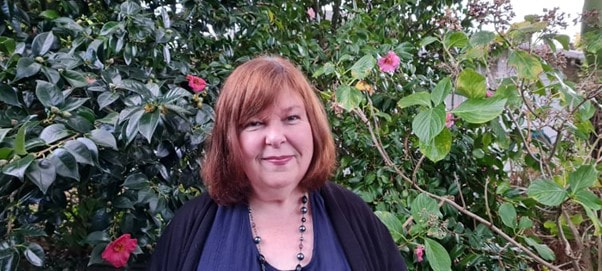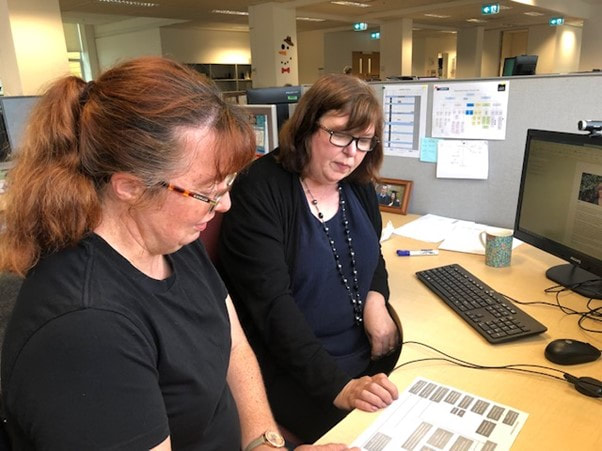TRICIA BINGHAM NEW TEAM LEADER OF INFORMATION LITERACY AT AUT
April 2022
|
I am very excited to have taken up the role of Team Leader for Information Literacy at AUT.
I have had a variety of roles over my library career starting as a library assistant at the University of Auckland and working my way up I started my Library career as a serials assistant at the University of Auckland in 1987. This was when we used Cardex (which some of you may remember) to record the receipt of journal issues and we tediously went through the individual cards every couple of months to claim missing items which were typed into a list and sent off via snail mail to the publishers. |
After a brief stint as Audiovisual Librarian, highlights of which included cataloguing several hundred ophthalmology videos (not for the squeamish), and cataloguer, I moved into an assistant librarian role at the Green Lane and National Women’s Hospital. Sadly, this was in the wake of the 'Unfortunate Experiment'.
As a librarian, it was interesting to note the effect this horrific episode of New Zealand history had on how clinicians approached and undertook research. There was a definite shift towards more evidence-based practice with clinicians much more routinely undertaking research to inform best practice.
A shift back to the University of Auckland gave me the opportunity to work as a subject librarian across a range of disciplines including medicine and health sciences, education, social work, counselling and human services.
In later years, I have worked as a Learning Support Librarian/Learning Designer designing professional development activities for librarians at the University of Auckland and working with subject librarians to integrate information literacy into the curriculum. This role also allowed me to work on a number of large projects including the University of Auckland compulsory academic integrity course and a MOOC on the same topic.
My final role at the University of Auckland was as a Learning Adviser, supporting students with both academic and information literacy. This was an incredibly rewarding part of my career and I feel gave me a much better understanding of the journey students undertake during their academic study at the tertiary level.
As a librarian, it was interesting to note the effect this horrific episode of New Zealand history had on how clinicians approached and undertook research. There was a definite shift towards more evidence-based practice with clinicians much more routinely undertaking research to inform best practice.
A shift back to the University of Auckland gave me the opportunity to work as a subject librarian across a range of disciplines including medicine and health sciences, education, social work, counselling and human services.
In later years, I have worked as a Learning Support Librarian/Learning Designer designing professional development activities for librarians at the University of Auckland and working with subject librarians to integrate information literacy into the curriculum. This role also allowed me to work on a number of large projects including the University of Auckland compulsory academic integrity course and a MOOC on the same topic.
My final role at the University of Auckland was as a Learning Adviser, supporting students with both academic and information literacy. This was an incredibly rewarding part of my career and I feel gave me a much better understanding of the journey students undertake during their academic study at the tertiary level.
What does your new job entail?
In my new role as Team Leader for Information Literacy at AUT. I will be supporting my team in the development of information literacy initiatives which enhance AUT students’ academic journey and contribute their overall academic success.
Why did this role interest you?
In a nutshell, I was drawn to this role as it combined my three passions: staff development, information literacy, and learning design. I am lucky that during my career I have had excellent exposure to all three of these passions. You can read a bit more about how I came to be in my dream role at AUT in my bio.
What projects will you be working on within your role?
I am very much the “new kid on the block” as I am only in my third week at the time of writing. As such no specific projects as yet, but I am looking forward to getting to know my team better and contributing to the already excellent Information Literacy initiatives happening at AUT.
In the future, what do you hope to achieve in this role?
I have a strong interest in evidence-based practice and how information literacy can contribute to the practice-ready practitioner. I also firmly believe that framing information literacy in terms of the competencies practitioners require can revolutionize the way information literacy is approached and scaffolded across degree programs.
Related to this I also feel there is interesting work to be done in thinking about how information literacy can impact positively on the “transitions” students make as part of their academic study. “Transitions” can include anything from moving between stages of a degree, returning to study as an adult or transitioning to tertiary study from high school.
Working with my team to develop learning and teaching capabilities will also be a key focus. Like most librarians, the majority of us are not trained teachers but understanding and applying sound learning theory and pedagogy I believe is vitally important. A student-centered and pedagogically robust approach has a profound effect on students’ overall learning experiences. As a team, I am keen for us to explore how to more successfully engage students in both online (thank you COVID) and face-to-face settings.
What does a working day in your new role include?
I am pretty new to my role so still in a learning phase as I become with systems, processes, the work my team is undertaking in the information literacy area, and the landscape of learning and teaching at AUT.
Currently, a typical day involves a fair sprinkling of the admin required to lead a team, responding to information literacy queries from academics and students, planning and implementing information literacy initiatives, and designing and delivering professional development initiatives for the team.
In a typical day, I also like to spend a part of my time horizon scanning to find out the current trends in information literacy and learning and teaching in the tertiary sector.
What advice do you have for someone aiming to progress their career in libraries and information services?
Take every opportunity to undergo professional training that is available to you. And think outside the box. Training doesn’t have to be specifically information literacy-related. The best thing I ever did was complete a Postgraduate Certificate in Higher Education. This has completely revolutionized my approach to the design and implementation of workshops and teaching activities as well as allowed me to better understand the needs of the staff and students I am working with. In turn it has led to me being able to take on coaching, mentoring and leadership roles in those areas. There are lots of less formal options too. Find MOOCs, online course, and LIANZA offerings. There are so many opportunities to develop and learn.
Put your hand up for projects and secondments. These not only help you experience different aspects of library work to find out what you enjoy but can also give you a leg up when applying for positions.
Find a mentor. I have been mentored by some amazing librarians over the years. As a group I find we librarians are without exception extremely generous in sharing our time and expertise. Having someone as a sounding board, advisor and support can help focus your career goals as well as inform pathways to achieve these.
Finally take a leap of courage and apply for that job which interests you even if you are not quite sure you fit the job description. In most cases, I have applied for positions because I liked the challenge of tackling something new and extending myself. It can be scary but is so rewarding….


